|
Ian Livingstone interview
Q and A with Ian Livingstone, executive
chairman of Eidos, co-author of the Fighting Fantasty books, and
creator of saucy management sim Beach Life
 Q.
How does Beach Life differ from other management games? Q.
How does Beach Life differ from other management games?
A. It's more about the enjoyment of the people watching than
the micro-management and the economic situation. I wanted to build
an environment that creates observational humour naturally, rather
than trying to be contrived or forcing something on people, and
not having to worry about the detail of the economics. A huge
variety of interaction between all the people having a great time
on their holiday, and it's not just about sex, it's about people
having a good time on holiday. It doesn't matter if that's extreme
sports, or drinking or playing pranks or just generally being
irresponsible for a couple of weeks. It's what people do in real
life and I just wanted to create real life. The key thing is to
appeal to a universal audience.
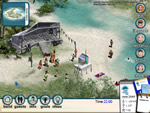 Q.
Are you targeting gamers or people who enjoy this type of holiday
themselves? Q.
Are you targeting gamers or people who enjoy this type of holiday
themselves?
A. I think will the gamers will lead it, but hopefully it will
gain a groundswell of positive feedback and will attract a casual
gamer audience - somebody's who's just been on holiday and wants
to recreate the time that they had.
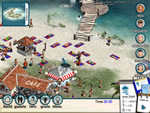 Q.
Are you hoping to replicate the mass-market appeal of The Sims? Q.
Are you hoping to replicate the mass-market appeal of The Sims?
A. The people-watching aspect has always been fascinating to
me. People have a dark side in their character, whether it's watching
road accidents, watching two people having a grope in a bus shelter
or watching people arguing or watching boxing - people are attracted
to watching other people doing stuff that they don't do themselves;
what they might want to do themselves, but can't, for whatever
reason. So, this allows you to do in the comfort of your own home
what you really would like to do.
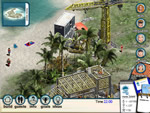 Q.
Does Beach Life represent any of your own experiences? Q.
Does Beach Life represent any of your own experiences?
A. I've had some pretty good holidays in my time [cackles evilly],
in Greece, in Spain: we're all young once, and we shouldn't forget
it.
 Q.
What kind of games would you like mentioned in the same breath
as Beach Life? Q.
What kind of games would you like mentioned in the same breath
as Beach Life?
A. It's in a category which is totally unique, but it obviously
will draw reference to The Sims, and perhaps something like Championship
Manager in a way - that's fantasising about people's lives, and
that's what we're doing with Beach Life.
 Q.
Do you feel Beach Life is an escape from the ever-growing number
of violent games, your own Deathtrap Dungeon included? Q.
Do you feel Beach Life is an escape from the ever-growing number
of violent games, your own Deathtrap Dungeon included?
A. I don't think violence in games makes people violent, especially
with children - they can't mentalise violence or horror, or anything,
and know that it's not for real. We're all curious about violence
- you look at some child psychologists that still don't understand
why young boys will pick up guns and young girls don't. Even if
you hide guns from young boys, they'll end up picking up a stick
or something that represents a gun. It's because, going back to
the jungle if you want to get that deep into it, we (men) were
the hunter-gatherers, we used to go out and throw spears at large
woolly mammoths and the women didn't. So there's this certain
innate desire to go on adventures and conquer environments and
deal with people who try to stop you from doing that. And there's
just no getting away from that. So if we can do it through the
medium of computer gaming rather than real life, that is a very
good thing.
 Q.
Is that conquering element you mentioned still present in Beach
Life, then? Q.
Is that conquering element you mentioned still present in Beach
Life, then?
A. Conquering manifests itself in all sorts of things now - being
on holiday, it's about impressing your mates. And how do you impress
them? You've drunk more than they have, you've had sex with more
girls than they have, and you have more money than they have.
That's a sort of tribal viewpoint of how people categorise success
on holidays, and that's how life is. Without getting too woolly
about it, like an artist painting how it is, I make a positive
experience of seeing people behave on holiday. There's a myriad
of programmes like Ibiza Uncovered, reps having torrid times,
or whatever.
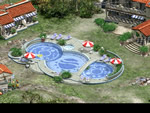 Q.
Do you think this game will stand the test of time, or is it likely
to only be successful as long as people are interested in Big
Brother and the like? Q.
Do you think this game will stand the test of time, or is it likely
to only be successful as long as people are interested in Big
Brother and the like?
A. I think the world's just becoming more liberal, and the more
liberal it becomes the more people will just want to do what they're
able to do.
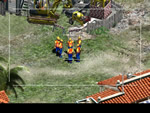 Q.
Are you concerned at all that the sex aspect might be detrimental
to this game's image? Q.
Are you concerned at all that the sex aspect might be detrimental
to this game's image?
A. I'm not scared. I don't want it to be seen as just a sex game,
but conversely, page three's never hurt The Sun. You don't buy
it for that, though, you buy it for the news, you buy it for the
sports, and the tongue-in-cheek articles that are in it.
 Q.
How would you feel if this led to a spew of copycat 'real life'
games? Q.
How would you feel if this led to a spew of copycat 'real life'
games?
A. As long as you do it responsibly and warn people about the
content, surely people are responsible enough to make a choice
about what they buy and what they don't buy. I think people want
believable environments now, and you've got to be able to describe
a game in 10 words, otherwise you're struggling. If you've got
to make a convoluted story that ends up with aliens out of the
basement, it's very hard to describe some of these games. All
I want to do is to tap in to somebody's experience in life, or
dreams, so if I said to you, "This is a game in which you
behave badly and have a lot of fun on holiday," you know
how to play it. Some games, it could take me five minutes to explain
it to you, by which time you've lost probably 80 per cent of the
consumers, not to mention the retailers who wouldn't know how
to sell it.
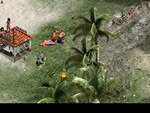 Q.
What games do you really wish had never happened? Q.
What games do you really wish had never happened?
A. I don't see myself as any sort of great censor, but I don't
like games that don't have this sort of realistic element to them.
It doesn't always have to be set in 2002, but I hate it when it's
just so ludicrous and contrived that I almost find it offensive.
What I was really happy with was the demise of the adventure game,
the point-and-click style, because to open a door in a room, I
had to put three biscuits on my head, hold the sign upside down
and whistle Dixie on a tin flute through my nose - and all I really
needed was a key. That for me is the realism in games - you have
to find a key to open a door. These convoluted programmer puzzles
were the most frustrating experience that could ever be launched
on mankind, and when they finally fell to Earth, I thought that
was a great thing. They were just too hard. The old ways of moving
levers around or moving blocks around have gone - move a chair,
or move real objects in a world where you believe that it's logical.
 Q.
That sounds quite contradictory to those Fighting Fantasy books
you used to do… Q.
That sounds quite contradictory to those Fighting Fantasy books
you used to do…
A. They were choices that you could make - I tried to make them
as believable as possible, but you were constrained by the medium
of a book. You couldn't create these rich, large environments
where you could use every object - you could only make simple
choices.
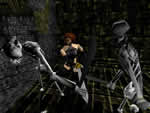 Q.
Are we going to see any more game versions of that franchise? Q.
Are we going to see any more game versions of that franchise?
A. It would be quite nice - the books are coming out again in
August, as its their 20th anniversary. There's a small publisher
launching a kids' label called Wizard Books, and they want to
publish them. Steve (Jackson) and I haven't got any thoughts of
it selling the volumes it did in the late 80s, early 90s, but
it's quite good to see it. Perhaps we'll see about something next
year, but it won't be like Deathtrap Dungeon. If I was to blame
myself about Deathtrap Dungeon, it's that I didn't end up paying
close enough attention to it and it ended up being an action game
with a lot of combat, rather than a roleplaying game with an inventory,
and using objects sensibly to do stuff for you. I've been a lot
more hands-on with Beach Life, checking what's going on at least
weekly, and making my observations.
 Q.
Does what you've seen of it so far meet your vision? Q.
Does what you've seen of it so far meet your vision?
A. Oh, definitely. I think it looks fantastic, all the art's
wonderful - we had a big argument as to whether it should be 3D
or iso view with tons of tons of hand-animated sprites. We went
with isometric and I think it looks really good.
Beach Life is due for release this summer. Further information
can be found at the Eidos
website.
|



